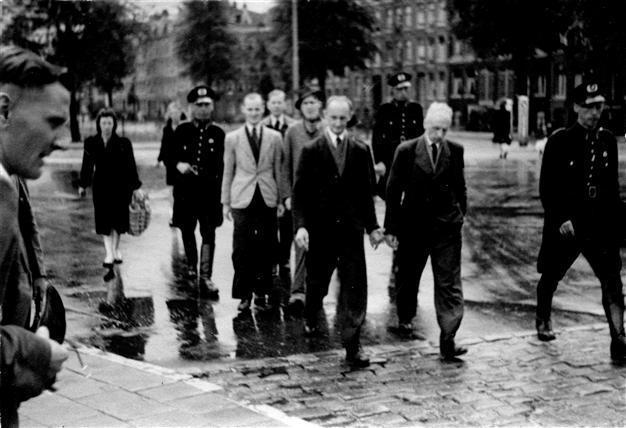Amsterdam made Jews pay rent while in WWII camps
AMSTERDAM - Agence France-Presse

A photo taken on June 20, 1943 shows a German raid in the eastern part of Amsterdam. AFP Photo
Amsterdam council has vowed to probe revelations that it forced Jews returning from World War II concentration camps to pay rent arrears, even if their homes had been destroyed or occupied by Nazis.The scandal, involving an unknown number of Jews and non-Jews living in city-owned properties, was uncovered by a young art history student in Amsterdam's archives.
Less than a quarter of Amsterdam's Jewish population survived the war, with the Netherlands occupied by the Nazis from 1940 to 1945.
"On their return, Jews received letters from Amsterdam council demanding the settling of their back rent," the art historian, Charlotte van den Berg, 23, told AFP.
The council even issued fines for late rent payments for homes that were confiscated and occupied by Nazi forces or members of the Dutch collaborationist NSB movement.
Van den Berg was a student at Amsterdam Free University when she made the discovery while digitising Amsterdam's municipal archives in 2010.
She decided to dig deeper.
"I wanted to know if the city had ever corrected these measures taken in 1946," Van den Berg told AFP.
"Unfortunately all I could find was a reduction in fines from 1947," some of which were levied on homes destroyed by Second World War bombings, she said.
Holocaust survivor David Bonte, 91, told Amsterdam's Het Parool newspaper that demands for back rent from Jews were widespread at the time.
His family received a bill in 1946 for unpaid back rent on their council-owned property.
"How dare they harass us, people who had been through so much?" he said. Van den Berg cannot yet say how many people or how much money were concerned by the rent demands.
"All I can tell you is that 342 people asked for money that they had paid to be returned. They weren't all Jews," she said. "Most of them were Jews, but there were also people who suffered through the war years in different ways, their business had no income for example and they just couldn't pay their rent anymore," she added.
There was however a procedure to get a partial refund on fines paid to the council for late rent.
"The cut off date for starting that procedure was May 1, 1948, and only half the fine could be refunded," she said.
Some of the letters written to Amsterdam council at the time show the anger and disbelief felt at the money being asked.
"People wrote about their return from the concentration camps or how they hid during the war. Penniless, they sometimes were just asking for a little more time to pay the bill," Van den Berg said.
A businessman named J. W. Levending wrote on June 29, 1946: "So we must again pay the piper? Those who for years lived in suffering, locked up, from whom everything was taken by the Germans."
"We get the bill that should have been paid by the men from the NSB; and fines despite the fact that we weren't even there. I wonder that these gentlemen the bureaucrats can be so ignorant of the situation that they demand such payments?" Despite the protests, Amsterdam's civil servants persisted with demands for money, strictly applying the rules.
Amsterdam City Hall has promised to probe the matter.
"We will investigate in order to find out exactly what happened, this will be done as quickly as possible and for as long as it takes," Bartho Boer, a spokesman for Amsterdam Mayor Eberhart van der Laan, told AFP.
The Central Jewish Council said it hoped that "the mistakes of the past would be corrected," its president Jigal Markuszower told AFP.
Of around 80,000 Jews deported from Amsterdam, where the vast majority of Dutch Jews lived, only 18,000 survived.
"The rent matter was already partly known, but details were missing," said Ronny Naftaniel, former head of the Centre for Information and Documentation on Israel.
"It's good that thanks to Ms Van den Berg's efforts this is resurfacing now," he said.
Amsterdam has now made contact with Jewish organisations, the national archives and others to find out to what extent Jews living elsewhere in the Netherlands were affected by the back rent demands.
















